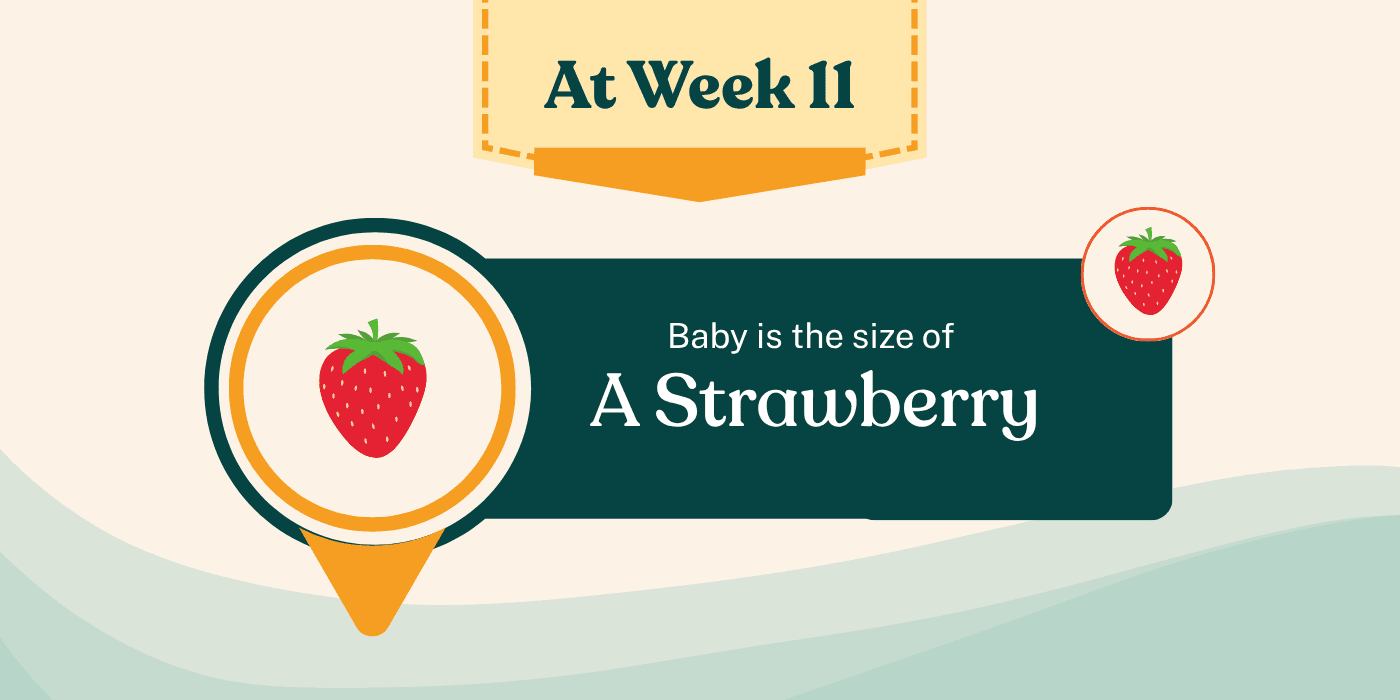Your Pregnancy at Week 11
Science photo library
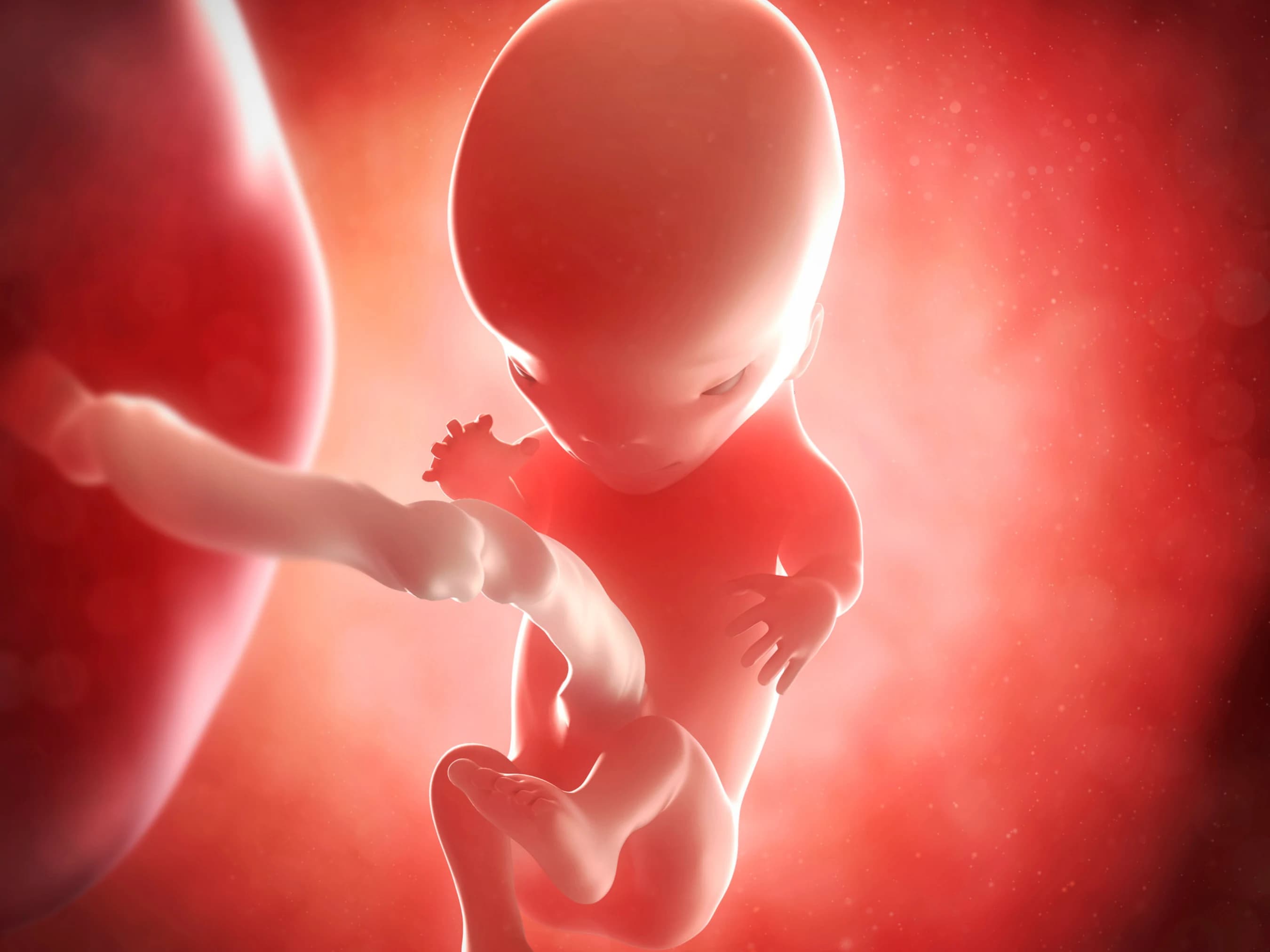
Written by Mindsmaking Medical Writer
Fact Checked by Mindsmaking Professionals
27th, July, 2025
With just two weeks left in the first trimester, you're about six months away from labour, which may seem exciting and daunting.
You're nearing the end of your first trimester, which is quite a milestone. You have 2 weeks to complete your first trimester and six months away from labour. This week, you might notice some changes in your symptoms, especially when it comes to nausea. It's like you're finally seeing the light at the end of the tunnel, with those relentless bouts of queasiness starting to ease up a bit.
Key Takeaways
By week 11, the baby's appearance resembles a normal human infant, with the head-to-body ratio changing significantly.
Your baby measures around 1.61 inches and weighs about 7.0 grams, comparable to a large strawberry.
Changes in physical appearance may progress slowly during pregnancy, but you might notice increased hair, fingernail, and toenail growth, which are attributed to hormonal fluctuations or increased circulation.
Leg cramps, especially at night, may occur and can be alleviated with stretching exercises, physical activity, and ensuring sufficient calcium and magnesium intake.
Symptoms such as fever, foul-smelling vaginal discharge, burning sensation while urinating, and pelvic pain may indicate a urinary tract infection (UTI).
Maintain good hygiene practices by washing hands regularly to minimise the risk of contracting illnesses, especially as the immune system operates at a lower level during pregnancy.
Reading a pregnancy book together regularly can strengthen the bond between partners and foster open communication.
Women expecting their second child or those carrying twins may begin showing earlier than first-time mothers-to-be.
Consider starting a baby book or journal to document your pregnancy journey and preserve precious memories.
Take a peek

Itty-bitty fingers and toes
Your child's webbed fingers and toes separate and resemble human body parts. Fingernail and toenail beds are also developing.
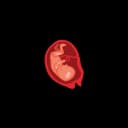
Baby head
Your baby's head accounts for approximately half his body length.
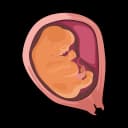
Ears
Your baby's ears have moved closer to their final position on either side of its little head.
Baby Development at Week 11
By this time, your baby looks more like a normal human baby than before. The head-to-body ratio has changed drastically. Your baby's head is almost half the length of its body. Fingers and toes have separated, and their skin remains transparent while bones start to harden.
Your baby or babies are making a lot of movement, but you still wouldn't be able to feel the movement.(4)
Your baby's nipple will become visible by week 11. The upper and lower limbs will no longer be disproportionate. At this stage, your baby would have developed a tongue.
At week eleven, the eyes are almost in the normal human position, closed, and the nose is becoming smaller.
The neck of your baby is now much more defined and distinguished. The ears will begin to move towards their normal position.(10)
Your baby's reproductive organs are developing rapidly, and If you wish to know, blood tests can now determine your unborn baby's sex.(13)
Ultrasounds are nearly as reliable at this stage. Studies indicate that between 11 and 12 weeks, ultrasound imaging accurately predicts the baby's sex in approximately 90% of cases.(8)
Mindsmaking
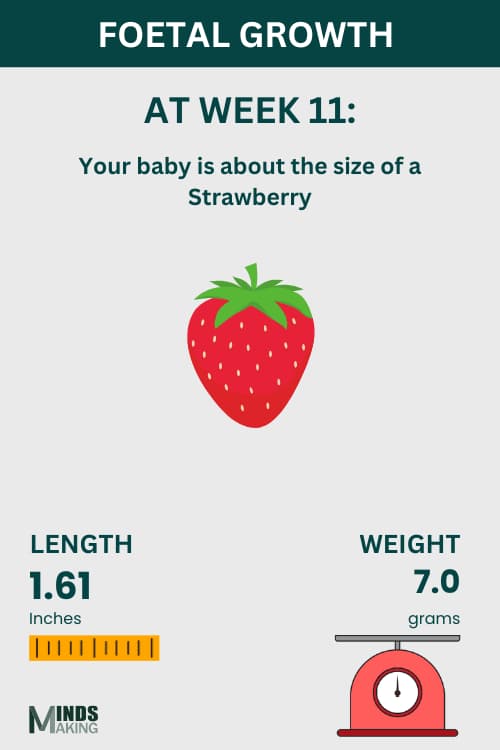
Body Changes at Week 11
As your baby grows rapidly within your uterus, visible changes in your physical appearance may still progress slowly. Some women observe changes in their hair, fingernails, and toenails. These changes are considered normal during pregnancy. While healthcare providers aren't entirely certain of the exact cause, they believe it could be due to increased circulation or hormonal fluctuations.(4)
As your belly expands, your muscles and ligaments stretch, which might cause discomfort around your stomach area. If the pain worsens, you must seek advice from your midwife or doctor promptly.
Your body is working hard, pumping about 50% more blood than usual. This increased blood flow is vital for nourishing your growing womb but can also lead to feelings of warmth, sweating, and dizziness. These sensations are signals from your baby, indicating the need for rest.
Previously, your baby relied on a yolk sac for nutrition, but now, a new organ called the placenta is preparing to take over. The placenta will provide nourishment and eliminate waste for your baby. During this transition, hormonal changes may leave you feeling fatigued and emotionally sensitive.(12)
Your appetite might also be increasing, which is a good thing. It's a sign that your morning sickness is waning and that your body is preparing to help you nourish your baby and yourself. Try to gain weight as efficiently as possible by eating nourishing foods and avoiding junk foods.
Read This Next
No posts available
Baby Bump at Week 11
Determining whether it's a baby bump or just gas and bloating can be tricky at 11 weeks pregnant. Particularly if it's your first pregnancy, you might not be showing much at this stage. However, women expecting their second child or those carrying twins may start showing earlier than first-time mothers-to-be.
Pregnancy Symptoms at Week 11

Heartburn
If you haven't had morning sickness, you might experience heartburn instead. Research indicates that around 95 per cent of women encounter nausea, vomiting, and or heartburn during pregnancy, which are common symptoms and typically harmless. Heartburn tends to worsen in the third trimester due to the growing uterus, but some women experience it throughout pregnancy. Managing it involves eating smaller meals, avoiding lying down after eating, and consulting your doctor about safe antacid use if it interferes with your ability to eat

Breast changes
Your breasts may become slightly larger, with further growth expected as your pregnancy advances. Some may welcome these changes, but frustrating for others, especially when bras no longer fit comfortably and even slight touches cause discomfort. This increase in size is partly due to the milk glands expanding in preparation for breastfeeding. You might gain up to three pounds of breast tissue throughout your pregnancy as your body prepares for lactation.

Dark Abdominal line
Dark Abdominal line: You may have noticed a dark vertical line running down the centre of your belly, known as the linea nigra or "pregnancy line." This line is believed to be linked to hormonal changes during pregnancy. It's a common occurrence and typically fades after giving birth to your baby.
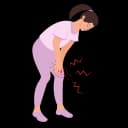
Leg cramps
At 11 weeks pregnant, you might experience tight and painful leg cramps, especially at night, which can disrupt your sleep. Stretching exercises and regular physical activity can alleviate leg cramps. Additionally, mineral depletion, particularly calcium and magnesium deficiency, may contribute to leg cramps, so ensure your diet includes sufficient amounts of these minerals. Staying hydrated is also important in preventing leg cramps.

Hair growth:
Hormonal changes during pregnancy can cause you to enjoy many good hair days, as these hormones can reduce the normal shedding of hair, giving your locks a thicker appearance. However, you might also observe increased hair growth on your face and body, which is also attributed to hormonal fluctuations during pregnancy.

Feeling hotter than normal
Experiencing sensations of heat and discomfort, even during cold winter days in early pregnancy, is quite common. At this stage, your body is circulating 50% more blood, making you feel like you're carrying your central heating system. To manage this, opt for light layers of clothing and stay hydrated by drinking plenty of water.

Mood swings
Mood swings could be attributed to heightened hormone levels during pregnancy. Avoid stress and ensure you're consuming enough iron in your diet. Activities like yoga, simple meditation, or relaxing music can help alleviate mood swings. If mood swings significantly impact your daily life, seek advice from your physician for personalised management strategies and support.

Hard or brittle nails
You may notice changes in your nails. While you may experience harder nails, others might find their nails more brittle. These changes can also be attributed to hormonal fluctuations during pregnancy. While harder nails can be a positive symptom, brittle nails may require additional care and attention to maintain their health and strength.

Vaginal discharge
As you progress through your pregnancy, you may notice an increase in vaginal discharge, a common symptom at 11 weeks. Pantiliners can help manage this discharge, which is your body's way of eliminating secretions from the vagina and cervix.
Pregnancy Concerns at Week 11
The risk of miscarriage remains at this stage. If you have a history of miscarriages, it's important to be particularly cautious. Warning signs of a potential miscarriage include excessive bleeding and abdominal pain. If you experience these symptoms, promptly contacting your healthcare provider for evaluation and necessary care is crucial.(2)
Fever, foul-smelling vaginal discharge, burning sensation while urinating and pelvic pain are symptoms of UTI. Speak with your OB-GYN or midwife if you experience any of these. Your obstetrician will give you some baby-safe antibiotics to use. It's also important not to resist the urge to urinate when necessary, as holding in urine can further elevate the risk of developing a UTI.(5)
Pregnancy can worsen chronic illnesses. Conditions like hypertension and diabetes can cause a lot of harm to you and your baby. Take all prescribed medication and exercise regularly. Also, regularly checking your blood pressure or blood sugar level is important.(9)
Health Tips for Week 11
Increase your calcium intake
To support your baby's development of strong bones and teeth, including around 1,000 milligrams of calcium in your daily diet is essential. While dairy products such as milk, yoghurt, and pasteurised cheese are excellent sources, you can also obtain calcium from alternative sources like almonds, salmon, tofu, and eggs.
Include omega-3 sources in your diet
Omega-3 fatty acids are a type of fat present in various foods, primarily oily fish like salmon and sardines, as well as flaxseed, broccoli, spinach, and walnuts. Including these foods in your diet during pregnancy is important because research indicates that omega-3s play a crucial role in your baby's brain development. Moreover, research suggests that consuming omega-3s during pregnancy might lower the risk of preterm birth. A scientific review of 70 studies found that increasing omega-3 intake reduces the likelihood of having a premature baby (born before 34 weeks) by 42%. This information provides valuable insight into the potential benefits of incorporating omega-3-rich foods into your pregnancy diet.
Stay hydrated
Pregnancy hormones can significantly impact your body's functions. The hormone hCG, in particular, increases blood flow to your kidneys and pelvis, leading to more frequent trips to the restroom. It's important to stay hydrated during this time, but limiting coffee intake is advisable as it can exacerbate the need for frequent bathroom breaks.
Get enough rest
Your body requires increased blood production during pregnancy, which can sometimes lead to raised blood pressure, resulting in feelings of faintness and dizziness. To alleviate these symptoms, try resting and elevating your feet above the level of your heart. This position can help improve circulation and reduce feelings of lightheadedness.
Prevent heartburn
To prevent heartburn or alleviate its symptoms, there are several strategies you can try. Research indicates that making minor lifestyle adjustments can help improve heartburn symptoms. These include avoiding spicy and fatty foods, opting for smaller but more frequent meals, and refraining from lying down within three hours of eating. (1)- If you continue to experience heartburn despite these measures, it's advisable to consult your healthcare provider.
Wash your hands regularly
During pregnancy, your immune system operates at a lower level than usual. It is beneficial as it prevents your body from viewing the growing baby as a foreign entity and ensures its protection. Your body may not be as effective at fighting colds as it normally does, making you more susceptible to symptoms like a stuffy nose, cough, and sore throat. Therefore, it's crucial to maintain good hygiene practices by washing your hands regularly and thoroughly. If soap and water aren't accessible, alcohol-based hand sanitisers can be a convenient alternative to help minimise the risk of contracting illnesses.
Boost your vitamin C intake
During pregnancy, you should consume approximately 80 to 85 milligrams of vitamin C daily to support the development of your baby's healthy bones and teeth. To increase your vitamin C intake, incorporate oranges, other citrus fruits, strawberries, tomatoes, and broccoli into your diet. These foods are rich sources of vitamin C and can help ensure you meet your daily requirements.
Advice for Partners
Make it a habit to read a pregnancy book together. This demonstrates your interest in the pregnancy to your partner and creates a space for open communication. It provides an opportunity for both of you to discuss any fears, excitements, or questions you may have about the pregnancy journey. Sharing this experience can strengthen your bond as a couple and help you navigate the journey with understanding and support.
Pregnancy Checklist for Week 11
As you progress through week 11 of your pregnancy and prepare for the upcoming weeks, you may find the following to do's beneficial:
- If pregnancy acne is troubling you, show your skin some care by opting for oil-free beauty products and cosmetics. Since excess oil often triggers acne, using greasy products can exacerbate the issue.
- To ensure you have adequate prenatal coverage, review your insurance plan or contact your healthcare provider for further information.
- Start shopping for your maternity wardrobe; it's time to consider elastic waistbands and ruched tops.
- Start creating your baby registry, even if your baby shower plans are not yet in motion. Starting your wishlist early will ease your mind later on, so you have one less thing to worry about as your pregnancy progresses.
- Consider starting a baby book or journal. It's a wonderful way to connect with your pregnancy and have a dedicated space to preserve all the precious information and scan photos.
- Build your support network as other moms and expecting mothers can provide valuable advice and empathetic support as they understand firsthand what you're going through.
Frequently Asked Questions
How is my baby developing at week 11?
By week 11 of pregnancy, your baby is beginning to resemble a more typical human infant. The head-to-body ratio has significantly changed, with the head now almost half the length of the body. Fingers and toes have separated, and bones are starting to harden beneath transparent skin. While your baby moves a lot, you won't feel these movements. Your baby's nipple will become visible, and the upper and lower limbs will no longer be disproportionate. At this stage, your baby would have developed a tongue. The eyes are almost in the normal human position and are closed. The nose is becoming smaller. The neck of your baby is now much more defined and distinguished. The ears will begin to move towards their normal position.
How big is my baby at week 11?
At week eleven, your baby is about 1.61 inches in length. This roughly equals the size of a large strawberry and weighs about 7 grams.
How will I feel at 11 weeks into my pregnancy?
You might be experiencing some of the 11 weeks symptoms, such as heartburn, vaginal discharge, leg cramps, mood swings, along with general aches and pains as your body undergoes numerous changes. Always listen to your body and take rest breaks when necessary.
Is it normal to experience a reduction or increase in sex drive at 11 weeks pregnant?
It's common for your sex drive to fluctuate during pregnancy due to changes in hormones. While some women may feel a decreased desire for intimacy, others might experience an increased libido. There's no standard "normal" for this, each person's experience is unique, and there are no strict rules to follow aside from any specific advice your physician provides for your pregnancy.
Is it possible to determine the sex of the baby at 11 weeks?
It is indeed possible through noninvasive prenatal testing, a blood test that can be performed from as early as 10 weeks into your pregnancy. Primarily, this test is used to identify any chromosomal abnormalities in the baby. However, the chromosomes that are tested include the sex chromosomes, so, at the same time, your doctor can tell you whether there's an X chromosome present or absent. The X chromosome is only there if you have a female foetus.
Was this article helpful?
How many stars are you giving this article?
Leave a comment
Your email address will not be published.
